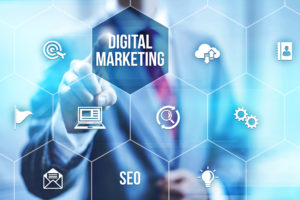
The Who, What, When, Why, and How of Digital Marketing for Law Firms
At its core, marketing is about connecting with clients in the right place at the right time. In this era of the internet, the right place is often online. That makes digital marketing crucial to law firms trying to grow. We get a lot of questions about what, exactly, digital marketing is. Here’s a quick breakdown of the who, what, why, when, and how of digital marketing for law firms.
What is Digital Marketing? 
Sometimes called online marketing, digital marketing refers to all marketing efforts that occur on the internet. By using digital channels like search engines, website content, email, and even other websites, law firms can connect with current and future clients. Some people also believe that inbound marketing and digital marketing are the same thing, but really inbound marketing is a component of digital marketing. Simply put, digital marketing is the use of online activity to meet your target audience where they are: online.
Why is Digital Marketing Important?
In this day and age, digital marketing is not a “nice to have” – it’s table stakes. Pretty much any brand these days has a website. Even if they don’t for some reason, they likely have a social media presence or even a paid advertising strategy.
Digital marketing and content are so common that today’s consumer expects it. In fact, they rely on various website content to learn about new services and choose brands that they want to work with. It is very difficult to compete in today’s legal landscape without a strong digital presence.
Some of the main benefits of digital marketing for law firms are:
- You can better target your audience and focus on those most likely to obtain your services.
- It tends to be more cost-effective than outbound efforts, with more ways to measure ROI.
- Smaller brands can compete with larger brands using tactics that don’t cost as much.
- Tactics are highly measurable, and it’s easy to adapt and optimize digital strategy.
- The quality of your leads will improve and you can tie in digital efforts with your overall sales process.
- Marketers can engage with people at every stage of the funnel.
Who Should Try Digital Marketing?
The short answer to this is: everyone. Many digital marketing tactics are low-cost and free, so there’s very little downside. Plus, they’re easy to measure. That means that you’re more likely to get a good ROI and you can adjust tactics until you get the results that you want. Plus, many people are looking online for solutions to their challenges. If you’re not discoverable to them, you’re leaving a lot of opportunity on the table. The truth is that you’ll have a hard time competing at any real level if you’re not participating in digital marketing.
When Should You Execute Digital Marketing?
There’s not a bad time to start digital marketing. As soon as you have legal services to offer, you should establish an online presence. Even if you’re just using free tools like social media and Google Analytics at first, do what you can to increase your web traffic and lead generation.
How Does a Law Firm Do Digital Marketing?
Now that you’re clear on exactly what digital marketing is, you probably want to know how to do it. There is no strategy that is perfect for every firm, but executing the following tactics is a good start:
1. Search Engine Optimization
The process of optimizing your website through on-page or off-page tactics, in order to appear in search engine results. Multiple channels benefit from good SEO, including your website, blog, infographics, etc.
Related: SEO for Law Firm Websites eBook.
2. Content Marketing
The creation and promotion of content assets with the goal of generating brand awareness, website traffic, and leads, and to share expertise. Thought leadership like blogs, white papers, ebooks, or infographics are effective tactics for creating trust and highlighting knowledge.
3. Social Media Marketing
Promoting your firm and your content through various social channels can drive increased web traffic and cultivate client engagement. You can use a tool like HubSpot to connect channels and build a cohesive strategy.
For a more in-depth look at how to create a winning social media strategy, check out this free eBook: Advanced Social Media Strategies for Law Firms.
4. Pay Per Click (PPC)
With PPC advertising, you pay a publisher a fee every time someone clicks on an ad that you are hosting on their platform. PPC is common in search engines like Google, but you can also have them on social media like Twitter.
5. Native Advertising
Advertising that is essentially promoting your firm but positioned as content, and displayed next to other content, is called native advertising. An example would be an advertorial in an online legal journal.
6. Marketing Automation
Software solutions can help you to segment your audience and then serve them various forms of marketing using if-then scenarios. Things like email sequences, social media posting schedules, lead nurturing workflows, and campaign tracking are all forms of marketing automation. (Check out this on-demand webinar on how law firms can use marketing automation for more information.)
7. Email marketing
Email is an essential way to communicate with your audience. It’s particularly great for welcoming new clients, nurturing leads, and promoting events.
8. Online PR
Securing online coverage builds trust and credibility with your audience. Consider digital publications, blogs, and other content-based websites where you’d like your firm to be featured. Tactics include reporter outreach, encouraging online reviews of your firm, and engaging with activity on your blog.
Check out this free webinar to learn how you can get your content noticed by the media.
9. Inbound Marketing
This is the practice of attracting, engaging, and delighting your audience at each stage of their journey. Your goal is to make people come to you, rather than tracking them down. Inbound strategies can use a variety of digital channels but the most popular are blogging, video marketing, and email marketing.
10. Sponsored Content
This is when your firm pays another brand or company to create and promote content that highlights your expertise or staff in some way. Influencer marketing falls into this category, but simple blog collaborations are another example.
Takeaway:
Chances are you’re already reaching some of your clients online, even if you don’t feel your firm is actively practicing digital marketing. No doubt you can think of a few areas where more attention could be beneficial. Hopefully, this post served as a good reminder of some key areas of digital marketing for law firms, but if you are starting from scratch or if your current digital marketing is not working for you, let us build an impactful strategy to help achieve your goals. Contact us today for a free consultation.
Are you ready to get started generating new, qualified leads?
Contact us to get started and let us help you energize your digital marketing and business development efforts.
Contact Us



